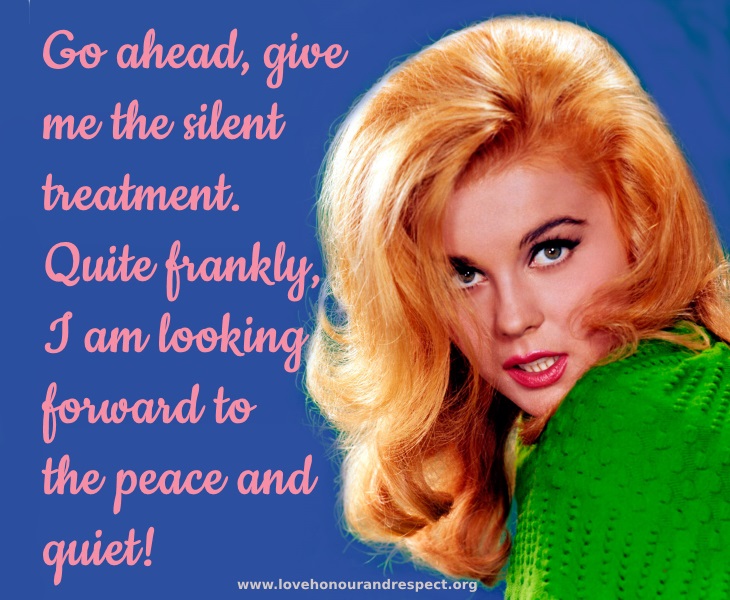Freezing People Out
Freezing people out (which is also referred to as the Silent Treatment) is sometimes a passive-aggressive manoeuvre and other times it’s an inability to say what you want. When an individual feels bad but is unable to talk to the other party about the situation that has caused the problem, this is usually caused by a blocked throat chakra. In cases where it is used as a method of controlling someone, it can cause alot of hurt and confusion. In such a case, being ‘silent’ is never a silent act. It is done with the aim to try to generate what the sulker wants: attention, power by creating uncertainty, and the knowledge that the other person is feeling hurt.
I lived through years of being given the silent treatment when I was a child. A close family member would use this as a way to control me, and all it did was cause me to become very rebellious and to feel more and more distant from this individual as time went on. In the end, her behaviour along with the physical and emotional abuse that she used against me, caused me to hate her with a vengeance. I couldn’t wait to leave home. Eventually though, with alot of work, self reflection and time I was able to forgive her, however, she never ever apologised for her behaviour, even when I asked for an apology.
Now, if someone does the same thing to me again, it immediately brings up all the same issues that I had in the past. I’m sure that other women who have also been through this can relate to what I’m talking about here. When a parent does this to a child, it causes alot of hurt and damage that leaves a scar which can be easily triggered again in the future. Within relationships it is often men who will use the silent treatment as a control mechanism, says Dr Petra Boynton, a relationship and sex therapist who works in Australia, although I’ve seen plenty of women do it too.
Sometimes it is an inability to communicate. Other times it is an outright calculated response to a situation that is designed to place the one who views him or herself as the dominant partner in a relationship back into a position where they feel in control because perhaps their “less dominant” partner’s pointing out of their mistakes has made them feel that they are no longer in control. Thus sulking or the silent treatment is their way of regaining control. The truth of the matter is that sulking is abusive, it is not kind, and it is not forgiving. It is the hostile behaviour of an adult who is simply an emotional child still.
This type of behaviour is learned during the games that young men and women play with one another while taking part in the dating scene in order to gain access to sex or attention. It is sometimes also learned when an individual has grown up in an environment where he or she saw or were the victim of verbal or physical abuse. It is totally dysfunctional behaviour and is unhealthy for the man or woman who is acting out this behaviour, and it damages and destroys relationships in the process, especially when it occurs again and again. If it is a behaviour that is repeatedly acted out, it is no longer a reaction to a situation, but rather it is a deliberate choice to act this way.
The best way to take the energy out of a situation like this is simply to get on with your life and ignore the one who is acting in this manner. Just take your power back. You don’t have to put up with childish behaviour like this. Giving the sulker no attention disempowers their games. If they don’t decide to change, then walk away, because if they act like this on a regular basis then it’s likely that they will always act this way. They will only change if they want to, and it’s not up to you to fix them.
If there are children involved, consider the example that you are setting for your kids. Do you want them to have role models who play dysfunctional games, or do you want them to learn how to relate to each other from parents who know how to have a dispute or disagreement and get over it? The only way to teach your kids is by example. What kind of example are you setting?
You should only ever be concerned about your own behaviour, your actions and responses, and your own levels of confidence. Everything else is up to the sulker to fix. Don’t try to rescue them apart from naming what they are doing and making them aware that you can see what they are doing. You can support them if they decide to make a change, but ultimately, whether or not they do change is up to them. The responsibility for freezing you out is totally theirs and theirs alone. So too are the consequences of their behaviour.
Be strong and walk free. Stand your ground and don’t go chasing people who refuse to change.
~.* ♥ *.~
Update February 2016: The first novel in our series of seven is now published. It is a courageous story of a young teen growing up in a home filled with domestic violence, and of how she manoeuvres her way through such a difficult situation. Click here if you’d like to know more about this novel.
Click here if you’d like to be taken to the site where you can purchase this novel.


